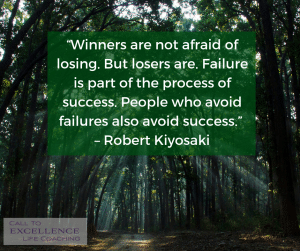
Let’s be honest. Failing doesn’t feel good. In fact, it feels like crap. It can hit like a sharp stabbing pain, or a dull whole-body ache. It can give you a sick feeling in the pit of your stomach. If it’s bad enough to drive you to tears, it gives you a stuffed up nose and puffy red eyes. It makes you want to crawl into bed, pull the covers over your head, and hide from the world.
Come to think of it, this sounds exactly the way a garden-variety cold feels, too. We feel like crud for a few days or maybe even a week, and then it gradually starts to go away. In a few weeks, we’re back to normal. We don’t give it another thought.
And that’s precisely where the similarity ends – in the different ways we react.
No one likes to come down with a cold, but with the exception of extreme germophobes, most of us don’t hide out in our homes during cold-and-flu season to avoid contact with anyone who might be infected. We take sensible precautions, like washing our hands more frequently and avoiding close contact with someone who is obviously sick, but we still go to work, we go out with friends, we get together with family. We do the things we want or need to do, and we live our lives.
In contrast, when we fail at something, we typically rehash it and ruminate about it and relive the pain over and over again. We can develop so much dread that we become afraid of failing in the future, because we never want to feel that bad again. We stop taking risks that would expose us to potentially failing. We stay under the proverbial covers.
What if we thought of failure in the same way we think of the common cold? What if it was simply an unpleasant cost of living?
When you study high-achievers in any field, this is pretty much what they do. They accept that failure is part of the price of success. The expect it to happen sometimes. They don’t try to fail – they want to win so they prepare as best they can and anticipate obstacles – but because they are constantly pushing the limits of their current knowledge and abilities, or because they’re in competitive situations with equally well prepared opponents, things don’t always work out the way they want. They don’t enjoy failing, they may even need some time to regroup, but they don’t let it stop them from continuing to go after their goals.
If you have any worthwhile goal or dream in your life, you’re going to encounter some setbacks and failures along the way to accomplishing it. You have two choices: you can play it safe, come up with a list of rational-sounding excuses, and make a half-hearted effort or put it on the back-burner for “someday”, OR you can go after it with everything you’ve got, and learn how to handle failure like a pro.
So, what are some ways we can develop a healthier perspective on failure? How can we shift our mindset to turn the fear failure from a mountain to a molehill?
Reframe the Fear: Failing to Fail Equals Failing to Reach Your Potential
Sometimes what it takes to get us past one fear is an even bigger fear.
Yes, you can live your life within your cozy comfort zone, stick with what you’re already good at, and avoid taking risks when there’s a chance you might fail or embarrass yourself. You can dodge an awful lot of failures this way.
It feels good in the short-run.
The problem is, when you come to the end of your life and start looking back, you’ll realize you’re going to die with a lot of unfulfilled dreams. You’re going to have to deal with the pain of regret, carrying the weight of all the “what ifs.” What if you had taken that opportunity? What if you had talked to that person? What if you had followed your passion? Who could you have been? What could you have accomplished?
And you’re going to realize that by avoiding all of the fleeting little failures, you’ve actually failed on an epic scale: you failed to live your best life, you failed to become the person you had the capacity to become, you failed to make your full contribution to the world.
One way or the other, you’re going to fail. It’s just a matter of choosing what you want to fail at.
I don’t know about you, but the older I get, the more this scares the crap out of me. It’s pushing me out of the shallow end of my pool and further and further into the deep end.
The way I see it now, every time I try something new and fail, I’m succeeding at living.
Recognize Failure Is a Speedbump, Not a Roadblock
Recently, I’ve been studying the lives of ultra-successful people for my “Profiles in Excellence” series, and the one thing that strikes me is how much they fail – especially athletes and performers. I mean seriously, they fail A LOT. Sometimes it’s on such epic and public levels, too, that no one would fault them for giving up.
But the examples we hear about don’t give up – somehow they find a way to persist, often through multiple failures or losses – and discover even greater success on the other side.
Their failures may have slowed them down, but they didn’t stop them from ultimately achieving their goal.
Expect Failure
Now, don’t get the wrong idea – I’m not talking about going around with a negative mindset where you expect failure around every corner. We all know people like this, and their attitude becomes a self-fulfilling prophecy.
No, what I’m talking about here is simply recognizing that when you begin something you’ve never done before, it’s going to take a little while to learn the ropes, develop new skills, and get your feet under you. It’s perfectly normal to trip and stumble and even fall when you’re starting out on a new adventure.
Success and sales guru Brian Tracy started a recent social media post with the statement “Nothing works the first time. Keep trying and don’t give up.”
I found that simple statement so freeing – throughout my life, I think I’ve given up too early on things I wanted more often than I should have. If the skills didn’t come relatively naturally and easily, if the doors didn’t swing wide open on the first try, I took that as some sort of a sign that whatever it was wasn’t meant to be.
What if we adopted a completely different mindset? What if we relaxed, acknowledging that the first time we try something, it’s just practice. We’re expected to mess up. It’s not that we shouldn’t try to do it to the best of our ability – making a whole-hearted effort will actually help to accelerate our learning – but we should temper our expectations about the results. If it does work, fantastic, but if it doesn’t, no big deal.
Depending on what it is we’re trying to learn or accomplish, it may take two, three, ten, or even a hundred tries, before we hit on the formula for success, or develop the skills we need. Success requires us to persist beyond the initial learning phase.
Get Used To It
In “The Dance of Fear”, psychologist Harriet Lerner recounts one of her cases, a man who was too afraid to ask the woman he was interested in for a date because of his fear of rejection (which is simply the fear of failure in a social interaction). Lerner diagnosed his problem as actually having too little experience with rejection, and assigned him an exercise: he was to go to a local department store and in one day, ask 100 women he didn’t know out for coffee. It worked – by the time he was about halfway through the exercise, he was immune enough to rejection that he decided it would just make more sense to ask out the woman he liked originally (for the curious, he did, and she said yes).
While this strategy won’t work in every situation (it’s probably not a good use of your time to start up 100 businesses with the intention to fail), there’s some validity to the idea that sometimes our fear comes from having too little, rather than too much, experience with failure.
The example in Lerner’s book was an example I could really relate too – I have a massive fear of rejection and I can see how it has held me back in life. So, one of the ways I’m challenging myself right now is by seeking out opportunities where rejection is likely, so I can build up immunity to the sting. For example, I’ve started inviting high-profile guests for interviews for my “Profiles in Excellence” series. So far, I’m 0 for 2. Disappointing but not surprising – and I discovered that the rejections felt no worse than a very mild cold, which is actually very empowering.
Another relatively safe way to build up some experience with failing is to take up a new hobby that’s far outside your natural talent comfort zone. If you tend toward artistic or brainy pursuits, take up a sport. If you’re the athletic type, take up something artistic. Shake things up – a lot. The idea here is to find something you’re not going to be any good at when you start out, in order to get comfortable with being uncomfortable. Plus, if you stick with it, you’ll learn that with practice you can and do improve over time, a lesson that can then be applied to other more important areas of your life.
Along these lines, I’ve started taking dance lessons. Now, I have all the natural grace and rhythm of a one-legged duck on dry land, so dancing is something I’ve always avoided. But, I found a very patient instructor, I’m pushing through the awkwardness and embarrassment, and I’m starting to see some very slow progress. More importantly, it’s empowered me to start thinking about other areas where I’ve placed limits on myself, and to see how else I can challenge myself.
Your Turn:
How do you cope with failure? What strategies have you found to be effective? Let me know in the comments below!
Further Resources
If fear of failure is holding you back from going after what you want in your life, I’ve found these two books to be very insightful on the topic, with actionable steps to start conquering this saboteur:
“Feel the Fear… and Do It Anyway” by Susan Jeffers
“The Dance of Fear” by Harriet Lerner







13 thoughts on “Failure and the Common Cold”
Hi Susan, I really loved the analogy with cold; and it’s so true. By “hiding” and giving up, we miss out on all the wonderful things we could have achieved. Excellent read!
Thanks Captain! You hit the nail on the head – the temporary pain of failure is trivial in comparison with the amazing things we get to experience and achieve when we come out from under the covers and push through it.
Great post Susan. And one I think we all need to hear and understand. Failure is such a scary thing until you realize that it’s only a stepping stone to success. But you gotta keep going to get there. Thanks for the reminder.
Thank Debrah! I love the image of failure as a stepping stone – just put your foot on it, stomp it, and move on 🙂
Reframing has been a big thing for me lately… Failure is inevitable, therefore – seeing things in a different way helps. Also, failures give us lessons. Lessons that will never be useful if we never learn how to see it.
Yes, JM – that is a great point, about seeing the lessons that failure provides – often, it is in the process of failing that we discover how to do something successfully!
Great post Susan. I discovered that I was more committed to playing it safe because I was terrified of failure. I did reframe my mindset and decided to be more of a risk taker. Now when I fail at something it just means I’m “alive” and I’ve expanded my world.
Thanks Elva! That is a great way to reframe it, and just think of how many adventures you’ve had that you never would have experienced if you’d kept playing it safe 🙂
A lot of people are afraid of failing that they didnt even want to try for the race. Simply losing is hard to deal with. I love Robert Kiyosaki quote at the first picture. This post has inspired to go out of my comfort zone and try challenge myself and not afraid of failure. Failure is painful but it is also making us stronger.
Yay! I’m so glad you feel inspired to push the boundaries of your comfort zone – get into the race! You will definitely grow stronger each time you tackle a new challenge, whether you succeed or fail, and most successful people say that you grow more and learn more from failure than you ever do from success 🙂
I liked the comparison of failure and cold. We are usually afraid of failure. But we must remember that failure teaches us more things than success.
Very true – failure is sometimes our best teacher! Thank you Devendra!
Failure has indeed taught me of so much, not only how to correct my mistakes to achieve what I was aiming for, but also life’s lessons such as humility and empathy. Thank you for this great post xx